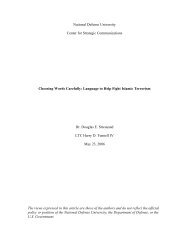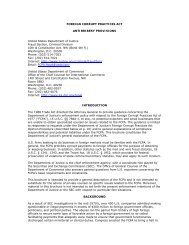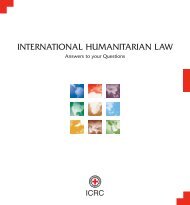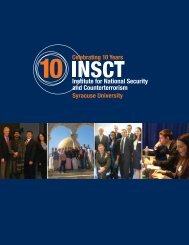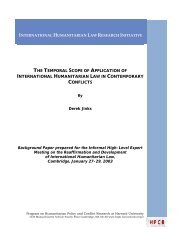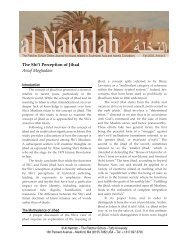some reflection on post-enlightenment qur'anic hermeneutics
some reflection on post-enlightenment qur'anic hermeneutics
some reflection on post-enlightenment qur'anic hermeneutics
You also want an ePaper? Increase the reach of your titles
YUMPU automatically turns print PDFs into web optimized ePapers that Google loves.
1428 Michigan State Law Review [Vol. 2006:1403glect. Because Islamic theological asserti<strong>on</strong>s of human equality are so explicit,many Muslim intellectuals and Islamic law scholars are quite complacentabout critically exploring the basis, c<strong>on</strong>tent, and history of the ideaof equality. Many have literally taken the religi<strong>on</strong>’s egalitarian asserti<strong>on</strong>sfor granted. 98 Uncritical discussi<strong>on</strong>s of human equality in the commentariesof the can<strong>on</strong>ical tafsir feed this complacency. This is a near-tragic state ofaffairs because issues arising out of Muslim misc<strong>on</strong>cepti<strong>on</strong>s and misunderstandingsof human equality are at the heart of a number of c<strong>on</strong>troversiesaffecting the Islamic world today. 99equality principle emphasize dignity as the key substantive comp<strong>on</strong>ent of equality. See id.While I acknowledge that human dignity is an important aspect of the Islamic view of equality,I will argue that the Islamic c<strong>on</strong>cepti<strong>on</strong> is based firmly in a theocentric worldview andnot in a primarily humanitarian worldview, as many people have come to believe. In makingthis argument, I have benefited greatly from Louise Marlowe’s excellent study of the intellectualhistory of Islamic egalitarianism. MARLOWE, supra note 92. Professor Marlowe’sstudy appears to be the <strong>on</strong>ly important discussi<strong>on</strong> of the topic.98. See, e.g., MASHOOD A. BADERIN, INTERNATIONAL HUMAN RIGHTS AND ISLAMICLAW (2003); ABUL ‘ALA MAWDUDI, HUMAN RIGHTS IN ISLAM (2d ed. 1995); SULTANHUSAYN TABANDAH, A MUSLIM COMMENTARY ON THE UNIVERSAL DECLARATION OF HUMANRIGHTS (F.J. Goulding trans., 1970); Abdul Aziz Said, Precept and Practice of HumanRights in Islam, UNIVERSAL HUMAN RIGHTS, Jan.-Mar. 1979, at 63; see also WilliamShepard, The Development of the Thought of Sayyid Qutb as Reflected in Earlier and LaterEditi<strong>on</strong>s of ‘Social Justice in Islam’, 32 DIE WELT DES ISLAMS 196, 221-22, 224, 227-28(1992) (translating paragraphs 13, 14, 21, 22, and 33 of Sayyid Qutb’s Social Justice in Islam).99. Some of the issues implicating c<strong>on</strong>temporary c<strong>on</strong>cerns about Muslim c<strong>on</strong>cepti<strong>on</strong>sof equality are the racial programs and possible acts of genocide in Darfur, women’sfull participati<strong>on</strong> in political and ec<strong>on</strong>omic sectors of Muslim societies, particularly <strong>on</strong> theArabian Peninsula and in the Persian Gulf, gender equality in marriage and inheritance law,the Palestinian Questi<strong>on</strong>, the tremendous inequities suffered by imported guest workers,domestic servants, and other laborers <strong>on</strong> the Arabian Peninsula, and the treatment and participati<strong>on</strong>of n<strong>on</strong>-Muslim minorities in majority Muslim societies. For a discussi<strong>on</strong> of theproblems in Darfur, see Report of the Internati<strong>on</strong>al Commissi<strong>on</strong> of Inquiry <strong>on</strong> Darfur to theUnited Nati<strong>on</strong>s Secretary-General (pursuant to Security Council Resoluti<strong>on</strong> 1564 of 18 September2004), Geneva, 25 Jan., 2004. With respect to the treatment of Muslim Africantribespers<strong>on</strong>s in Darfur, the Commissi<strong>on</strong> found:Based <strong>on</strong> a thorough analysis of the informati<strong>on</strong> gathered in the course of its investigati<strong>on</strong>s,the Commissi<strong>on</strong> established that the Government of the Sudan and theJanjaweed are resp<strong>on</strong>sible for serious violati<strong>on</strong>s of internati<strong>on</strong>al human rights andhumanitarian law amounting to crimes under internati<strong>on</strong>al law. In particular, theCommissi<strong>on</strong> found that Government forces and militias c<strong>on</strong>ducted indiscriminateattacks, including killing of civilians, torture, enforced disappearances, destructi<strong>on</strong>of villages, rape and other forms of sexual violence, pillaging and forced displacement,throughout Darfur. These acts were c<strong>on</strong>ducted <strong>on</strong> a widespread and systematicbasis, and therefore may amount to crimes against humanity. The extensivedestructi<strong>on</strong> and displacement have resulted in a loss of livelihood and means ofsurvival for countless women, men and children. In additi<strong>on</strong> to the large scale attacks,many people have been arrested and detained, and many have been held incommunicadofor prol<strong>on</strong>ged periods and tortured. The vast majority of the victims



